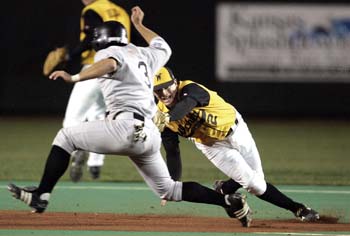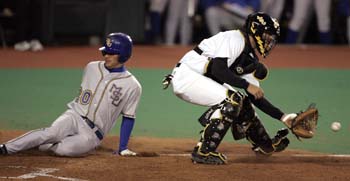
feel like I’ve done anything.”
Although they are the best of friends, Shocker baseball players Nick McCoola and Joe Muich disagree about one detail concerning America’s pastime: What’s the toughest position to play?
Muich, a catcher, says his spot is the most challenging. “Shortstop is No. 2,” he says matter-of-factly. McCoola, of course, just happens to play shortstop. And he has a slightly different viewpoint on the good-natured debate between buddies.
“A shortstop has to actually field the ball,” he says with a chuckle. “A catcher just has to catch it and throw it back to the pitcher. How tough is that?” Whether you side with Muich or McCoola, all fans would probably agree that this cliché is true: To be successful, a baseball team needs to be strong up the middle — especially at shortstop and catcher.
The Shockers are fielding a young team this season, so having seniors like McCoola and Muich at key positions is a luxury. “This team has a lot of new faces,” assistant coach Brent Kemnitz ’80 says. “When you’ve got Muich behind the plate and McCoola at shortstop, that’s definitely a great start to having some solid play up the middle.”
McCoola: A true Shocker
The artificial turf at Eck Stadium helps save infielders from bad hops, but it deprives McCoola of something he enjoys: getting dirty.
McCoola says head coach Gene Stephenson talks often about how players need to have a love for the game. McCoola, a Durango, Colo., native, shows his fondness for the sport by giving his all at every opportunity.
Thus, McCoola stretching out his 5-foot-11-inch, 175-pound frame to stab a hard-hit grounder has become a common sight at Shocker games. “I play the game hard,” he says. “That’s why I don’t like playing on turf — because my uniform doesn’t get dirty. If my uniform isn’t dirty, I don’t feel like I’ve done anything. It’s a guarantee that I’ll dive once a game, even if it’s just a courtesy dive.”
McCoola’s passion for the game is an inspiration to his teammates, says Muich, who describes his teammate as a “true Shocker baseball player” and a “throwback.” He adds, “He’s scrappy, he’s tough, he dives for everything. He plays hard no matter what.”
While the Shockers struggled offensively during their 19-6 start, McCoola stood out as one of the team’s hottest hitters. In his first 24 games, he batted .337 and chipped in 15 RBI. He led WSU in runs (19), hits (32), and total bases (40). “He’s our best hitter,” Muich reports. “He’s like a gnat at the plate, always getting on. He’s a clutch hitter, too.”
If McCoola continues hitting at his current pace, it will mean a marked improvement over his junior season when he hit .305 with 46 runs scored. As a freshman, he hit .300. “I’m off to the kind of start I wanted,” he says. “My goal is to get 100 hits this year, and that’s a pretty big goal. Two hits a game is what I want.”
McCoola says a switch in the batting order helped him feel comfortable early. After hitting seventh or eighth as an underclassman, he spent most of the early season this year in the No. 2 slot. “I enjoy it,” he says. “Gene puts the hit-and-run on with me a lot. And it’s fun to get more at bats. I usually don’t feel like I’m in the game until I get that first at bat.”
In addition, McCoola undoubtedly gained confidence by finishing last season in impressive fashion. He was named to the All-Missouri Valley Conference tournament team and to the All-Regional team in Fayetteville, Ark. “He’s just rock solid,” Kemnitz says. “He’s a very, very solid defensive shortstop. He comes to play every day. A lot of times fans may not leave the park talking about him, but the coaches realize how much he does for us.”

pitches.
Making his own calls
Muich has improved at the plate since he arrived at WSU from the small town of Fenton, Mo. But he takes more pride in his ability to call a good game from behind the plate.
In many collegiate programs, coaches decide what pitches will be thrown and relay it from the dugout to the catcher. But at WSU, Stephenson and Kemnitz allow catchers to call their own games.
“That’s one of the main reasons I came here,” Muich relates. “I didn’t want someone force-feeding me what to do. Catchers who don’t call their own games don’t have to think; they just become robots. To call pitches, you have to have a feel for the game and the hitters. My job is to make the pitcher more comfortable so we’ll get better results. The guys know I’ll block anything and do whatever it takes. I got their backs.”
Kemnitz, who serves as the Shockers’ pitching coach, says Muich compares favorably to any Shocker when it comes to calling pitches. That’s high praise, given WSU’s tradition of producing smart, talented catchers — players such as Eric Wedge fs ’89 and Doug Mirabelli fs ’97, who were high draft picks and reached the big leagues. “Joe’s a very cerebral guy, very intelligent and very intuitive,” Kemnitz says.
A treat for Muich has been the opportunity to catch junior Mike Pelfrey, a hard-throwing right-hander who is considered one of the top pitching prospects in the country. “It’s real easy catching him,” Muich says. “All I have to do is put the numbers down, and he’s throwing them. It’s nice because he doesn’t shake me off much, if ever. When he’s throwing 98 (mph), you don’t have too many problems, obviously. He’s a guy you’d like to catch for the rest of your life.”
Kemnitz also praises Muich’s defensive ability: “Look at the number of guys he throws out, the number of pitches he blocks.” The 6-1, 205-pound Muich has developed into a threat at the plate, as well.
After hitting only .237 with two homers as a sophomore, he enjoyed a breakthrough season of sorts by batting .293 with four home runs last year. “The team we had last year, with All-Americans up and down the lineup, it didn’t matter whether I hit or not,” Muich says. “It took the pressure off of me.”
This season, though, the Shockers are expected to rely on pitching while scrapping to manufacture runs. So the pressure is on Muich to produce. He admitted he started the season “pressing too much,” and the result was a .227 average through 25 games. “Once I start relaxing, I’ll be fine,” he says.
Dreaming of Omaha
Both players hope to get a shot at pro ball after their Shocker careers. McCoola loves playing shortstop, but he says a position switch might be necessary. “I might have to move to second,” he says. “We’ll see.” Muich’s father put him behind the plate as a boy for one simple reason: “Dad was a pitcher in college, and he always said the fastest way to the big leagues is by being a good catcher.”
But McCoola and Muich stressed that their immediate focus is on a team goal: helping the Shockers reach the College World Series in Omaha. “It’s our last year, and we still haven’t made it to Omaha,” McCoola says. “This is it for us. We want to make it happen.”





